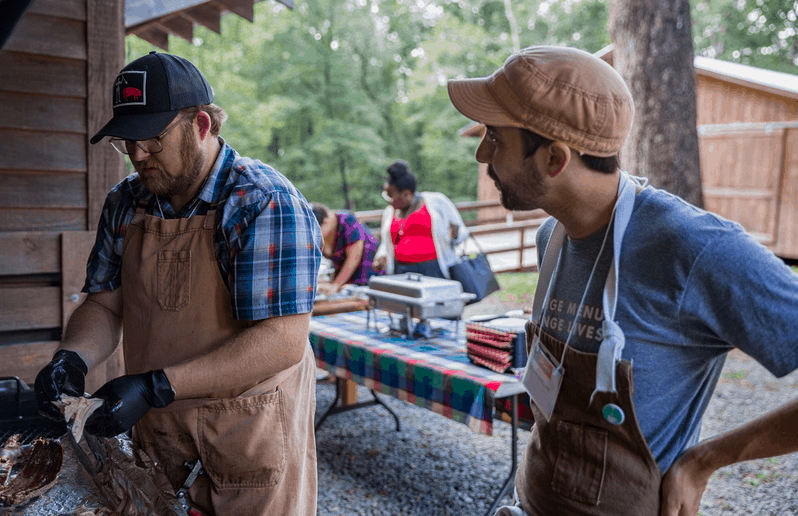Editor’s Note: The inaugural Carolina Food Summit explored the intersections of food and policy, hunger, nutrition, school lunch, and family ties. Our co-founder Ferrel Guillory invited some students from one of his journalism classes to cover the summit. Given our belief that first person perspectives and nurturing young voices matter, we wanted to spotlight their work.
Rain pattered on the roof of the barn at Rock Quarry Farm adding a natural melody to the voices of chefs, writers, restaurant owners, and non-profit members sharing their experiences with the food industry.
“Today is going to be about conversations,” said Marcie Cohen Ferris, an American Studies professor at UNC-Chapel Hill.
People from all over North Carolina came to the first annual Carolina Food Summit to hear stories and perspectives from more than 40 food industry professionals in attendance.
Throughout the two days in September, participants were asked speak on current issues or contribute in panels discussing certain topics.
A panel discussion, moderated by Andrea Weigl of The News & Observer, had participants consider a single word pertaining to food and explain what that word meant to them.
Hunger
Reverend Richard Joyner, Founder of the Conetoe Family Life Center, said his first face-to-face encounter with hunger came during a series of funerals.
Before many of the funerals, he said he noticed much of the food would go missing. Concerned, he spoke to a woman about the vanishing food and she told him that many go to the funerals because it’s an opportunity for them to bring food home. Otherwise, they would go hungry.
“I realized that I had been pastoring the church, and living in this region, but I had no clue of the food insecurities that was sitting right in the congregation,” he said. “My theology was telling me to get them to heaven, but I wasn’t teaching them to live on earth.”
From that moment on, Joyner said he made it his mission to remove the stigma — that those who feel hunger should be guilty and ashamed by building an organization that would provide food to the community.
“It provides many people not only access to healthy food, but access to healthy relationships, character, integrity,” he said.
In what used to be a food desert, an area where food options are limited, Joyner brought abundance and peace of mind.
Change
Wyatt Dickson, pit master at Picnic a barbecue restaurant in Durham, explained how changes shaped his life: change in his career path, change in the pig industry, and change in his awareness of where food comes from.
After leaving law school and deciding to make barbecue, Dickson strayed from the normal path of factory farms and instead established relationships with old-school farmers in North Carolina.
“I’m not doing anything novel, I’m doing something really old and using pigs the way they were used 50 years ago before we started playing with their genetics and feeding them weird stuff,” he said.
By using “real pigs,” he said he could make better barbecue. And by being a steward of the state’s classic cuisine, Dickson said that he hopes to further the conversation for restoring a historic practice.
“The biggest compliment to me comes from really old people saying that this is what barbecue tasted like when I was a child,” he said. “That melts my heart and makes me know that I’m on the right track.”
Flavor
Ricky Moore, chef at Saltbox Seafood Joint, explained that flavor goes deeper than the food itself. It reflects individuality and contribution to the culinary landscape of an area.
“Growing up in Eastern Carolina, I had a sort of culinary DNA,” he said. “That DNA was referred to as country cooking, or ‘soul food’. That meant one pot cooking, that meant things simmering on the stove all day, that meant simple preparations.”
That combination, he explained, was the flavor of his hometown.
“By paying attention to the regional nuances and using my own background as a reference, I’m finally beginning to understand flavor,” said Moore. “And I think I’m helping to bring flavor to the industry. A lot of times, heritage doesn’t get represented but I’m trying to positively shed a light on it.”
Policy
Scott Marlow, executive of the Rural Advancement Foundation International, focused on how public policy affects the food industry.
In a food system in which food just “emerges,” Marlow said, individuals are completely disconnected from where their food comes from. Issues such as diet and genetically altered organisms stem from policy that values efficiency.
“The paradigm I think we should look to is resilience and resilience is very inefficient,” he said.
When Congress writes a new farm bill, Marlow said there are six aspects that should be considered: who owns the land, who controls the water, who owns the seeds, the right of communities to feed each other, the integrity of science, and the integrity of democracy.
Sustainability
Chef Scott Crawford of Crawford & Son in Raleigh took a slightly different approach to sustainability. Scott explained that he has made it his mission to find a more sustainable model for people who work in restaurants.
As a troubled teen, Crawford discovered the restaurant world when he was in need of a job and few would hire him.
“I found that restaurants were these magical places that welcomed everyone and it welcomed me with open arms,” he said.
Crawford excelled at the craft and rose through the ranks. However, he admitted the pay was deplorable and employees were expected to work successively long days leading to 24-hour shifts and sometimes 100-hour workweeks.
“I couldn’t understand how the life that surrounded such a beautiful craft was so wretched,” he said.
Searching for restaurants that practiced a sustainable people model, Crawford said that he learned four things: people aren’t meant to work 80 hours a week under extreme stress, he had to take ownership of his personal sustainability, balanced healthy people perform better, and the industry needs to focus on the sustainability of their people.





